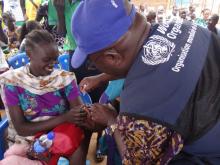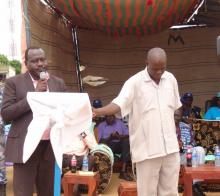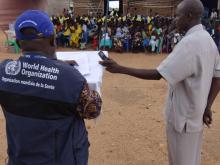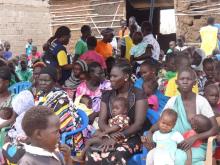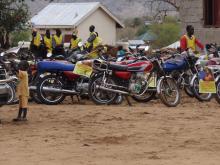Amid multiple health challenges and famine, WHO and partners strive to immunize over 3 million children against polio
03 March 2017, Juba, South Sudan – Despite multiple humanitarian crises, including famine, the first round of the National Immunization Days of 2017 is underway throughout South Sudan aiming to reach over three million children under 5 with two drops of polio vaccine.
The four-day campaign, undertaken by the Ministry of Health with support from WHO and other partners, are part of efforts to ensure that the country remains polio-free and immunization stays in the forefront of primary health care activities. More than 18 000 trained vaccinators will carry out the campaign using both house-to-house and facility-based services to reach all eligible children nationwide.
South Sudan has remained polio-free for the last seven years, but recent cases in Nigeria and the disruption in routine health services, coupled with low coverage of routine immunization, places the country at risk for importation of the virus.
Insecurity, accessibility and logistical challenges continue in many areas, including in Panyinjar, Leer and Mayendit Counties, where famine was recently declared. For the campaign to be effective in these areas, it will be implemented over 10 days to allow for overcoming security and access challenges. To further improve vaccination coverage, special strategies, such as evening vaccination and working with security and rapid response teams with access to insecure, remote areas, will be used.
“Conflict can have devastating, multi-generational impacts, but by leveraging our partnerships in South Sudan, we are able to continue investing in children’s health, which is a vital investment in the country’s future,” said Dr Abdulmumini Usman, WHO Representative to South Sudan. “The implementation of vaccination campaigns is a strong opportunity to reach children everywhere in the country with cost-effective, high-impact life-saving interventions and strengthen the systems that deliver these services to the children of South Sudan.”
As the largest contributor to immunization efforts in South Sudan, WHO provided operational and technical support, including deploying senior supervisors to states to support State Ministries of Health to achieve a high percentage of vaccination coverage.
Under the leadership of the Ministry of Health, WHO and its partners, including UNICEF, Rotary International, USAID, the Bill and Melinda Gates Foundation and many others, continue to support South Sudan in remaining polio-free and ensure that efforts are coordinated to protect children and future generations.
____________________________________________________
For more information please contact:
Dr Sylvester Maleghemi, +211 956 779 467, maleghemis [at] who.int (maleghemis[at]who[dot]int)
Ms Jemila M. Ebrahim, +211 950 450 007, ebrahimj [at] who.int (ebrahimj[at]who[dot]int)
Below:
01 Dr Bimpa Lupanzula, gives an anti-polio drop to a child during the campaign launch at Jebel Dinka
02 Dr James Jada, the state Minister of Jubek State making remarks at the official launching ceremony of the first NIDs of 2017 at Jebel Dinka, Jubek State
03 Dr Bimpa Lupanzula, WHO EPI officer making remarks at the official launching ceremony of the NIDs





